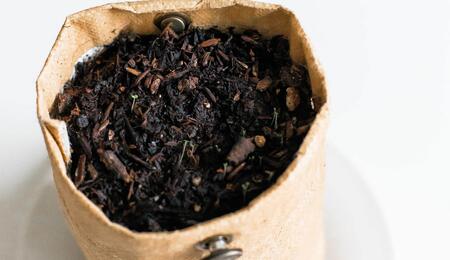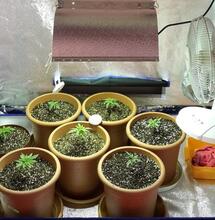Compost Tea for Your Cannabis Plants: What is it and How it Works?

Compost tea has become a pretty popular solution in recent years among cannabis growers. It could well be the magic ingredient in your garden too.
Compost tea is a popular alternative to synthetic fertilizers for cannabis plants. It's easy to make and use in your garden, and its benefits for your plants are numerous.
Green-thumbed pot enthusiasts are always looking for the best ways to optimize productivity‒sizeable yields, top-notch quality, big buds, and effective ways to cut costs. The weed industry, however, is mindlessly pushing synthetic fertilizers without completely understanding the biosystems involved in nutrient uptake and disease management.
This leads amateur growers to overuse these fertilizers resonating that more nutrients equal larger yields. However, what actually happens is the crop produces a massive salt buildup which results in a nutrient lockout, extremely flushing, and dead microbes.
Compost tea is a popular alternative to these synthetic fertilizers which has been lately gaining a lot of traction as an essential variable on sustainable crop production.
Considerable anecdotal evidence doubled with scientific research now proves compost tea can defeat the plant diseases and pathogens while boosting the quality and the yields through microbial activity.
Compost Tea for Cannabis Plants
To put it simply, compost tea is what you get when you soak a bag of compost in a bucket of water. The nutrients that started out in the compost end up in the water (the tea), and you get an organic liquid fertilizer. Compost tea is packed with microorganisms and nutrients which are beneficial for your weed garden. So, it’s a more complex liquid fertilizer and it takes more than soaking comfrey in water.
Why is compost tea beneficial for your cannabis plants?
It was not until recently that compost tea skyrocketed from obscurity to a popular fertilizer used by cannabis growers. Compost tea introduces nutrients, good bacteria, and fungi both if you apply it directly to the soil or use it to spray the leaves of your plant; it assists the plant’s growth and safeguards it from diseases and pathogens.
Even though the benefits of compost tea are recently gaining considerable notoriety in the agricultural field, some naysayers still claim the nutrient solutions provide no benefits whatsoever to the plants.
However, pot gardeners who have tried brewing compost tea for their cannabis crops report notable perks.
The main goal of using tea compost is to develop microorganisms to improve the soil health, promote robust yields, and boost the immune system of your plants.
By spraying the plants with the compost tea solution, good bacteria will kick out the harmful bacteria and boost the plant’s immune system and its ability to resist disease.
By applying tea compost to the soil, you are extending the plant’s access to nutrients that are abundant with healthy microorganisms. These organisms have the ability to oxygenate the soil, hold nutrients, assist water retention, aid the growth of vigorous roots, and improve your plant's ability to absorb much-needed nutrients.
While you should never use compost tea as a total replacement for soil additives for your cannabis garden, it can have tons of benefits when used as a soil drench. When used as a foliar spray, compost tea can complement the soil with micronutrients and protect your crop from diseases.
Compost tea main ingredients
It’s essential to make sure you are using the right ingredients and the correct tea compost recipe, so your cannabis garden can benefit. The right compost tea has the ability to extract the soluble microorganisms and nutrients from compost, including fungi, bacteria, nematodes, and protozoa.
Compost
Naturally, you can’t get compost tea without the compost. As the base of the nutrient solution, a good compost should be rich in nutrients and microorganisms. Browse for compost locally and consult with local gardeners, as this will ensure the compost microorganisms have already ‘met’ with other local bacteria. Mycelium-rich compost will help facilitate fungi growing in the tea.
Fish hydrolysate
You can also use fish hydrolysate for your compost tea, which is basically ground-up fish and crustaceans (crab, lobster, shrimp) transformed into a liquid phase. As a nitrogen-rich solution, fish hydrolysate feeds and supports the population of fungi and is also a great immune booster. You can either buy the end product or make it yourself at home, as it’s very easy to make.
Worm castings
Where there is a garden, there need to be worms, yes. Worm casting manure is an organic fertilizer produced by earthworm waste. As earthworms eat through compost, their ‘feces’ are optimal soil enricher. A worm casting enables a wide range of refined nutrients for the cannabis plants to consume.
Molasses and kelp
These two compost tea ingredients are added to help bacteria and fungi grow once the tea starts brewing.
Molasses provide fast-acting sugars to feed tiny bacteria. Readily available in various forms, molasses can be purchased from natural food shops or supermarkets. As a natural soil amendment, molasses provide macro- and micro-nutrients and all sorts of vitamins to organic cannabis plants and they can be easily applied for your cannabis plant’s tea compost.
Kelp on the other hand supports the fungi. It’s perfect for fungi to attach on it, multiply and develop.
You can also browse organic tea recipes to get some more ideas about what to include in your tea.
How to make compost tea
While it may sound like a complicated and annoying process, preparing your own tea compost is fairly easy.
Start with building the brewer for your compost tea
Even though you can buy pre-built tea brewers, making one yourself is easy to do and cost-effective. To build your own tea brewer, the following materials are needed:
- A bucket and lid, ideally 5-gallon. However, based on how big your cannabis garden is, adjust the bucket accordingly
- Air pump (use the aquarium one)
- Aerator
- Large 12 x 12-inch nut milk bag
- Small screw end metal hook
You should attach the air pump to the aerator and place it outside of the bucket. The air pump and aerator will add oxygen in the water to allow microorganisms to breathe. Use the milk bag to place the tea ingredients.
Continue with making the tea
When the aerator and air pump are in place‒connected to the bucket, start with creating the compost. Fill half of the bucket with mature compost‒don’t overdo with the filling and don’t pack the compost down. The compost should be loose, so the aerator can work.
Fill the rest of the bucket with water. Add enough so the mixture can fill the bucket and leave about 3 inches (8 cm) headroom at the top, so you can stir the tea without making a mess. Stir the mixture gently.
The tea may take around 30 hours to brew, so try to do this procedure when you have enough time, like during the weekend. Some sources suggest brewing can last up to 48 hours, or 24 hours if you are lucky. If you know that you're using water that's treated with chlorine you may want to give some more time for the chlorine to dissolve, thus spend more time brewing. However, be cautious and avoid killing your tea by over brewing it.
Keep your brewing tea away from heat and sunshine and frequently check on the air pump to see if it’s running and if there is enough oxygen in the water.
Nourish your plants with tea
You can apply the compost tea to your cannabis plants in various ways. You can add directly to the plants’ roots or use it as a foliar spray to drizzle the plant’s leaves.
For optimal results, apply the tea to the soil two weeks before the plants start to bud. If you are using the tea as foliar spray apply it during the evening or early morning when the plants are not superimposed on the sun. You can also dilute the tea with water: use 1:2 ratio for foliar spray or 1:20 if you are using it for the roots.
Feel at ease when applying greater dosages of the tea compost. A natural tea compost can’t do any damage to your plants. Nevertheless, observe how your plants react to it when you apply it.
While your first compost tea might not be perfect, it sure gets better with practice. As you see the benefits tea compost brings for your cannabis plants, preparing compost tea may easily become a regular activity in your garden.



